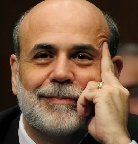
Bank regulation is caught up in political maneuvering. Pro and con lobbying groups are spinning legislators. Furthermore, ideologues are more concerned with whom to punish and how to protect consumers against the consequences of their foolish choices.
Meanwhile, a cadre of Ivy League MBAs are salivating at opportunity to flex their mettle. So they are anticipating loopholes that the voter-driven Congress will present to President Barack Obama. What is more disingenuous, Obama will sign it, and together with congressional leaders, they will celebrate the watered-down, mini-step purported to prevent the next financial meltdown.
Consumer advocates want to punish big banks and Wall Street's financial institutions. By contrast, the banks and Wall Street want laissez-faire capitalism with minimal intrusion from the government.
Meanwhile, on June 16, Ben Bernanke, Chairman of the Board of Governors of the Federal Reserve System, addressed the group of pundits at Squam Lake, New York. He praised their efforts to find solutions to banking regulation. "In the jargon of economists and regulators, supervisors need a macroprudential as well as a microprudential perspective," he said as if no one other than his Ph.D. colleagues cared to understand his words.
For those of us are hankering for plain English, he added, "How do we strengthen the financial system and its oversight so as to minimize the risk of a replay of the recent financial crisis?" And in case we're begging for more straight talk, he added, "And should a crisis occur, how can we limit its economic costs?"
But whenever Bernanke gets into details, Ivy League MBAs listen intently to interpret what he means. And so do the banking lobbyists. They are willing to accept some regulation, vague restrictions that allow wiggle room and slower growth for financial institutions -- at least for the ones that accept federally-insured deposits.
The Federal Deposit Insurance Corporation and the National Credit Union Administration backs insured banks and credit unions. These institutions should not be allowed to put taxpayers' money at unreasonable risk. No one argues with that premise. The debate is about what activities constitute excessive risk.
White House advisor and former Federal Reserve Chairman Paul Volcker is coaching the Obama Administration. He wants a return to the Depression Era Glass-Steagall Act. It would prohibit federally insured institutions from dealing in securities.
The banks say that it is overkill. Furthermore, they claim that owning derivatives can lower their risk by hedging against fluctuating interest rates. While it is true that banks are wise to minimize their risks, they can purchase hedges without being securities dealers.
Investment bankers without federally insured deposits should be permitted to make markets in derivatives, including the notorious credit default swaps. All investment vehicles traded, however, must be on exchanges that can be scrutinized by federal regulators. What is more, the investment bankers should be required to maintain risk-based reserves dependent upon the quantity and quality of their investments.
Federally insured institutions should also be required to hold more reserves and be 100 percent transparent on all their dealings. Their reserves should increase based upon size and types of investments.
Some legislators blame Fed Chairman Bernanke for not anticipating the financial meltdown. That is because it is the Fed's job to control the money supply and interest rates. The critics say that his unrelenting orchestration of low rates and too much money chasing too few deals motivated institutional investors to take imprudent risks. Their traditional investments were not yielding enough profit so they looked for riskier instruments with higher returns. Government-sponsored enterprises, Fannie Mae and Freddie Mac also jumped on board and need to be restructured.
But Bernanke is resisting being reined in. He says that the Federal Reserve needs to remain independent and must not be pressured by political events.
Bernanke's colleague, Dennis Lockhart, President and CEO of Atlanta's Federal Reserve Bank adds, "I'm concerned about measures that would have the effect of politicizing the Federal Reserve and especially the Fed's decision making on matters of monetary policy."
It is, however, the Fed's policy of keeping interest rates too low and not controlling the money supply adequately that had institutions, investors and savers taking imprudent risks in a search for higher yield. "Importantly, monetary policy should not swing with the daily news or be influenced by short-term political pressures," Lockhart says.
"I'm concerned that certain legislative proposals could compromise the independence that enables the Fed to stay on course," Lockhart says. "Some proposals now pending in Congress would, in effect, roll back the clear exclusion of monetary policy from auditing."
During the January speech, Lockhart went on to support his case for independence without taking responsibility for mishandling the monetary policy leading up to the financial debacle.
And in case we do not buy into his logic, he took his Fed-speak jabberwocky up a few notches. "In the real world, uncertainty resulting from injudicious reforms will be factored into asset prices and borrowing rates by the world's markets and will make recovery more expensive."
We need reform. Real transparency, thoughtful regulation and seamless execution by motivated federal watchdogs can make a difference. And importantly, officials speaking to us in plain English will also help.
Jerry Chautin is an award-winning business and real estate columnist. He is a former entrepreneur, commercial mortgage banker, commercial real estate dealmaker and business lender. You can follow him at www.Twitter.com/JerryChautin
